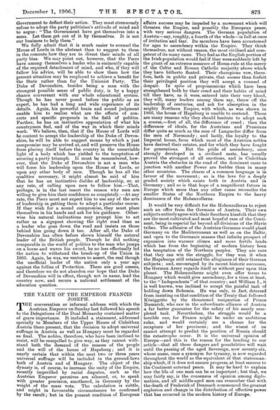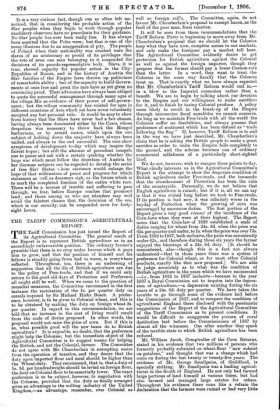THE VALUE OF THE EMPEROR FRANCIS JOSEPH. T HE conversation or
informal address with which the Austrian Emperor on Sunday last followed his speech to the Delegations of the Dual Monarchy contained matter of grave importance. It included a statement, addressed specially to Members of the Upper House of Cisleithan Austria there present, that the decision to adopt universal suffrage in Austria as well as Hungary must be regarded as final. The nobles, therefore, who have been inclined to resist, will be compelled to give way, as they cannot with- stand both the demand of the masses of the people and the will of the house of Hapsburg ; and it is nearly certain that within the next two or three years universal suffrage will be included in the ground-laws both of Austria and of Hungary. The object of the dynasty is, of course, to increase the unity of the Empire, recently imperilled by racial disputes, such as the Austrian Emperor perceives are silenced, or, to speak with greater precision, smothered, in Germany by the weight of the mass vote.- The calculation is subtle, and might in favourable circumstances be confirmed by the• result ; but in the present condition of European affairs success may be impeded by a movement which will threaten the Empire, and possibly the European peace, with very serious dangers. The German population of Austria—say, roughly, a fourth of the whole—is full at once of irritation and fear. Its members have been accustomed for ages to ascendency within the Empire. They think themselves, not without reason, the most civilised and com- petent of its many races. They feel as the English portion of the Irish population would feel if they were suddenly left by the grant of an extreme measure of Home-rule at the mercy of the Celtic and Roman Catholic majority above which they have hitherto floated. Their champions vow, there- fore, both in public and private, that sooner than forfeit their privileged position they will accept a counsel of despair. In spite of repossessions which have been strengthened both by their creed and their habits of mind till they have, as it were, entered into their very blood, they will, many leaders among them say, throw off the leadership of centuries, and ask for absorption in the mighty Northern Empire, with which, as was shown in 1866, the house of Hapsburg is unable to contend. There are many reasons why they should hesitate to adopt such a course,—first of all, the difference of creed ; then the difference of ideals, for the Austrians and Prussians differ quite as much as the men of Languedoc differ from the men of Normandy ; and lastly, the loyalty to the Imperial house, from which most of the Austrian nobles have derived their estates, and for which they have fought for generations. But the pride of ascendency, once strongly developed in a civilised caste, has usually proved the strongest of all emotions, and in Cisleithan Austria the obstacles in the road of the dominant caste to junction with another Power are feebler than in many other countries. The charm of a common language is in favour of the movement ; so is the love for a deeply graded society which exists both in Austria and in Germany ; and so is that hope of a magnificent future in Europe which more than any other cause reconciles the smaller States of the Northern Empire to the heavy dominance of the Hohenzollerns.
It would be very difficult for the Hohenzollerns to reject such an offer from the Germans of Austria.. Their own subjects entirely agree with their Southern kinsfolk that they are the most cultivated and most hopeful race of the Conti- nent, being in especial far beyond all divisions of the Slavic tribes. The adhesion of the Austrian Germans would plant Germany on the Mediterranean as well as on the Baltic, and open to the Germanic masses that infinite prospect of expansion into warmer climes and more fertile lands, which has from the beginning of modern history been the temptation of the Northern peoples. They are sure that they can win the struggle, for they won it when the Hapsburgs still retained the allegiance of their German subjects ; and, encouraged by its recent historic successes, the German Army regards itself as without peer upon this planet. The Hohenzollerns might even offer terms to Hungary which would give ascendency, for a time at least, to the " Independents " of that country ; and. William I., it is well known, was inclined to accept the painful task of holding down Bohemia. He was only, in .fact, deterred from insisting on that condition of the Treaty that followed KOniggratz by the threatened resignation of Prince Bismarck, who saw in the subordinate alliance of Austria a far better guarantee for the safety of his nearly com- pleted task. Nevertheless, the struggle would be a terrible one, for France might be under an ambitious ruler, and would certainly see a chance for the recapture of her provinces ; and the wisest of us cannot attempt to predict the position of Russia should the catastrophe occur. It is the universal opinion of Europe—and this is the reason for the heading to our article—that all these dangers and possibilities will wait until the passing of the aged Sovereign, now seventy-six, whose name, once a synonym for tyranny, is now regarded throughout the world as the equivalent of that statesman- ship which, if it does not ensure progress, at least secures to the Continent external peace. It may be hard to explain how the life of one man can be so important ; but that, we may fairly say, is the consensus of opinion among diplo- matists, and all• middle-aged men can remember that with the death of Frederick of Denmark commenced the greatest explosion and change in the distribution of effective power that has occurred in the modern history of Europe. It is a very curious fact, though one so often left un- noticed, that in considering the probable action of the Slav peoples when they begin to work through popular machinery observers have no precedents for their guidance. No Slav people has ever been really free. It has always been asserted that the Poles were; but that is one of the many illusions due to an exaggeration of pity. The people of Poland when their nationality was crushed were the slaves of an aristocracy so proud of its privileges that the veto of even one man belonging to it suspended the decisions of its pseudo-representative body. Slays, it is true, showed capacity for popular action in the City- Republics of Russia, and in the history of Austria the Slav families of the Empire have thrown up politicians of remarkable ability ; but of the capacity to build Govern- ments at once free and great the raze have as yet given no convincing proof. Their advocates have always been obliged to quote the successful management through many ages of the village Mir as evidence of their power of self-govern- ment; but the village community has existed for ages in different countries of Asia which yet have never voluntarily accepted any but personal rule. It would be easy to show from history that the Slays have never had a fair chance, having always been dominated either by the Czars, whose despotism was necessary to throw back the Mongol barbarians, or by armed castes, which upon the one subject of holding down the majority have always been united, and always in the end successful. The race show symptoms of development to-day which may inspire the fairest hopes ; but still the absence of precedent compels one to pause and ask with a certain quaking whether the huge war which must follow the desertion of Austria by her German subjects can be expected to develop the series of free Slav States v. hose existence would enlarge the hope of that millennium of peace and progress for which statesmen as well as dreamers sigh, as the future which is to mark the completed freedom of the entire white race. There will be a morass of trouble and suffering to pass through, we fear, before Europe reaches that promised land ; and those among us who are islanders may well avoid the faintest chance that the dominion of the sea, which is our security, can be suspended even for forty- eight hours.































































 Previous page
Previous page